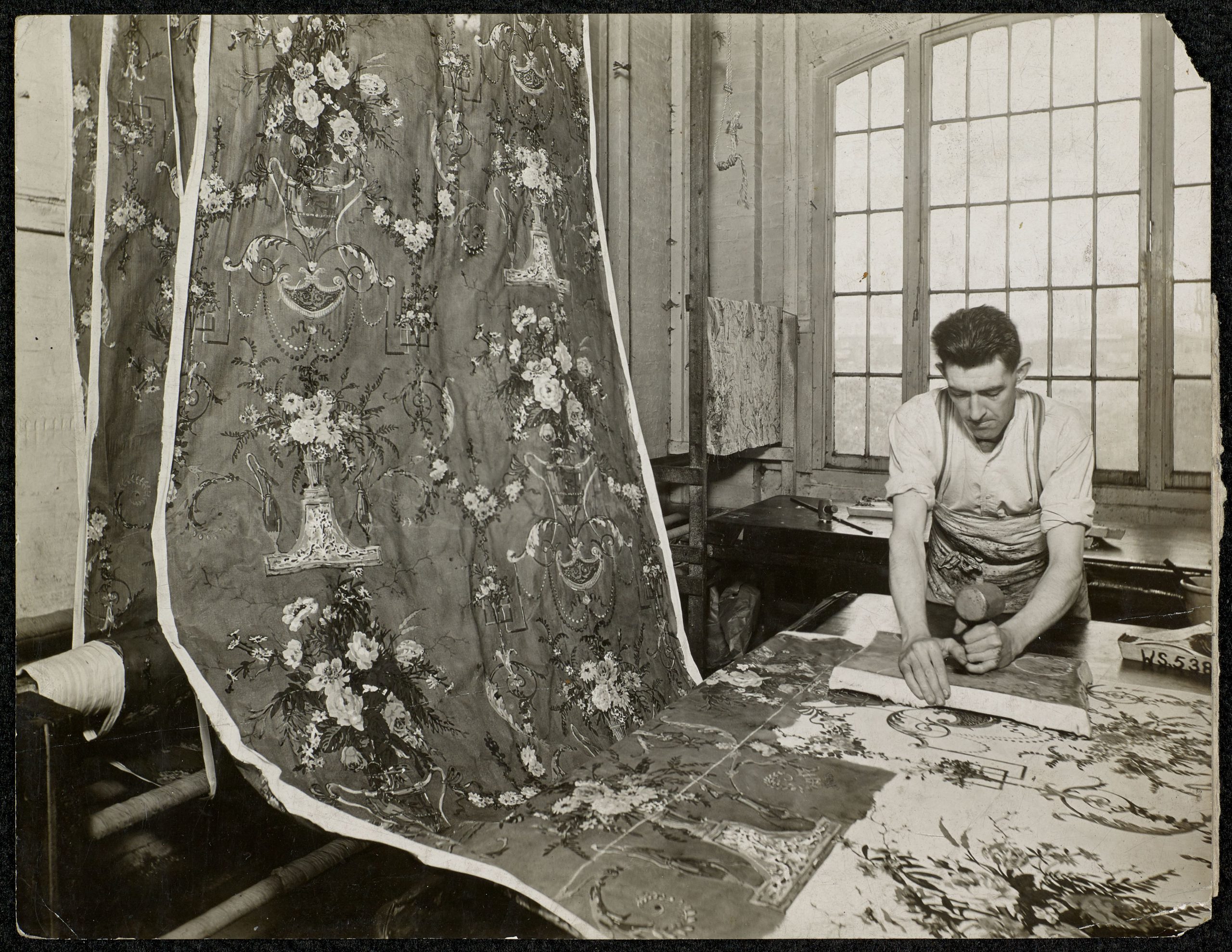The University of Essex is helping to uncover the hidden commercial potential of an important historical archive
The Warner Textile Archive (WTA) is the largest publicly owned collection from a luxury textile manufacturer in the UK. The archive is housed in the original Warner & Sons mill in Braintree that was refurbished in 2004 to hold the significant collection.

The Warner Textile Archive (WTA) is the largest publicly owned collection from a luxury textile manufacturer in the UK. The archive is housed in the original Warner & Sons mill in Braintree, Essex that was refurbished in 2004 to hold the nationally important collection.
The WTA is a historical treasure trove comprised of over 100,000 items, including paper designs, point papers, loom cards, trial samples, textiles, production records, photographs and manufacturing equipment. At their pinnacle, Warner & Sons were producing fabric for royal weddings and funerals, and decorating historic palaces. The business also pioneered several manufacturing techniques that have never again been replicated including three pile velvet.
The Challenge
The Warner Textile Archive holds the business archive of Warner & Sons, their predecessors and successors, illustrating how luxury textile manufacturing changed over 150 years in a town famous for its medieval cloth trade through to the birth and international growth of silk manufacturer Courtaulds.
The WTA identified digitisation, digitally enabled applications and business development as strategic priorities, and a Digital Strategy was approved by their Board in September 2020. The pandemic reinforced the need to define an implementation plan and a coherent approach to maximize the research and commercial potential of the WTA and its owner Braintree District Museum Trust (the Trust) more widely.
The collaboration between the University of Essex and the WTA was supported by EIRA’s Innovation Voucher scheme. The WTA wanted to explore and prioritise which parts of their collection would benefit from research in greater detail, both in terms of their public role and commercial potential for future WTA income growth.
The Approach
The project was delivered by the lead academic, Dr Alix Green, and PhD student, Samantha Woodward working in close collaboration with Robert Rose, Museums Manager, and Sophie Jemma, Archivist of Braintree District Museum Trust.
Dr. Alix Green’s experience and expertise were uniquely aligned with supporting this project. She has a long-term research collaboration with the John Lewis Partnership Heritage Centre and Archives and is currently working on a project with the GSK and M&S archives. Dr Green is committed to developing innovative models of collaboration between historians and archivists to help demonstrate the value of archival collections and historical research to parent organisations and wider stakeholders. There were also opportunities to learn from an earlier EIRA Innovation Voucher project for Essex Record Office, which she co-directed with University of East Anglia digital humanities expert, Dr Lorna-Jane Richardson.
The collaboration between the University of Essex and the WTA created a PhD student placement, supported by a co-funded bursary. During her placement, Sam Woodward undertook extensive desk research and conducted interviews with leading industry experts. Her report addressed strategic
questions in relation to the Trust’s digital strategy to fulfil their public mission to educate and provide new opportunities for income generation.
The Outcome
The Warner Textile Archive has three main commercial income streams commissions, licensing and wholesale. Commissions are received from historic properties, retailers, and interior designers. The WTA’s designs are licensed for a wide variety of products ranging from ceramic tiles, clothes, textiles to wallpaper. Designs from the WTA are now manufactured for sale in a long term collaboration with Claremont Furnishing Fabrics Company, a wholesaler of specialist textiles to the interior design and decoration industry with showrooms in London, Los Angeles and New York.
The project team was able to successfully identify the core elements of the WTA that would greatly benefit from further research and were able to develop a clear implementation plan to support the delivery of their digital engagement strategy and methods to increase access to commercial clients and the wider public.
PhD student Sam Woodward joined the project team from the beginning to end (January – March 2021) in order to develop a framework through further research into key areas of the strategy and methods identified by the project team.
Sam Woodward said:
“This project has benefitted from the shared knowledge and expertise of the archival and heritage sector. Throughout the placement, I have spoken to and interviewed industry experts and their insight was invaluable to shaping the findings of the final report for the WTA.”
Sophie Jemma, Archivist at Warner Textile Archive, commented that:
“Being able to access professional academic support from the University of Essex at this stage of formulating a wider digital transformation at Warner Textile Archive is invaluable.”
The EIRA team had the following to say about their experiences of working on the project:
“Through leveraging the expertise from the Department of History, a small EIRA project has generated tangible value for the WTA in navigating its future use of digital technologies in reaching out to the wider community. This EIRA-enabled collaboration has demonstrated the important role that Universities play in supporting organisations deliver their strategic plans for future development.”
Future projects, including research and prototyping digital tools are currently being considered by the Trust. The report’s insights are also helping management to allocate scarce resources into prioritising investments into new services and potential markets. In addition, the report has helped the WTA to address Intellectual Property Rights in relation to their digital assets.
Next Steps
The income generating opportunities and potential benefits from this project are cross sector, including tourism, heritage, creative industries, textile, design, education, place making and community.
Future follow-on projects, including those for prototyping digital tools, methods, and processes are currently being considered by the Trust. Future collaborations with the History Department at the University of Essex are also being planned.
Contact for any queries
Robert Rose, Manager of the Braintree Museum Trust, Warner Textile Archive
